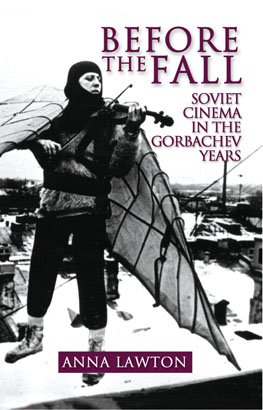
About the Author
Anna Lawton is a specialist in Russian film history. Professor Lawton teaches courses in visual culture and film studies at Georgetown University. She served on the National Gallery of Art Film Advisory Board, and has written extensively in scholarly journals and periodicals. Her books on cinema include The Red Screen: Politics, Society, Art in Soviet Cinema, and Imaging Russia 2000: Film and Facts.
BEFORE THE FALL: Soviet Cinema in the Gorbachev Years
Anna LawtonNew Academia Publishing, 2004
334 Pages, 35 Illustrations
ISBN 978-0-9744934-0-4 Paperback
ISBN 978-0-9832451-3-1 e-Book
$9.99 e-Book
For BULK ORDERS, order directly from New Academia Publishing.
Order ebook from (Amazon Kindle) www.amazon.com; (Kobo) www.kobobooks.com; (Kobo Coupons) http://www.therawfeed.com; (Barnes&Noble Nook) www.bn.com; (Sony ReaderStore) http://ebookstore.sony.com; (Google Ebook Store) http://ebooks.google.com; (Ingram Digital) www.diesel-ebooks.com; iBookstore (iPad/iPhone); any ebook retailer.
Queries: orders@newacademia.com
About the Author
Anna Lawton is a specialist in Russian film history. Professor Lawton teaches courses in visual culture and film studies at Georgetown University. She served on the National Gallery of Art Film Advisory Board, and has written extensively in scholarly journals and periodicals. Her books on cinema include The Red Screen: Politics, Society, Art in Soviet Cinema, and Imaging Russia 2000: Film and Facts.
About the book
Second edition with a new added chapter
Original title, Kinoglasnost: Soviet Cinema in Our Time
(Cambridge University Press, 1992)
This is an expanded edition of Kinoglasnost: Soviet Cinema in Our Time. The book examines the fascinating world of Soviet cinema during the years of glasnost and perestroika—the 1980s. It shows how the reforms that shook the foundations of the Bolshevik state and affected economic and social structures have been reflected in the film industry.
A new added chapter provides a commentary on the dramatic changes that marked the beginning of democracy in Russia.
This book will be widely read by students and specialists of Soviet/Russian history, culture and society, and film studies, as well as by anyone with an interest in the transformations of Russian society.
Praise
“What makes Kinoglasnost pre-eminent among current studies of the subject is that sustained attention Lawton pays to changes in the formal organization of Soviet cinema and in the cinema industry.”
– Julian Graffy, Sight and Sound, vol. 3 (July 1993).
“Lawton’s book now stands as a valuable work of history on one aspect of a collapsed system…This remains as a testimony of a fateful moment that has changed the course of history.”
– Louis Menashe, The Russian Review, vol.53, No.4 (October 1994).
“The author constructs a complex, multilayered narrative of a steady and significant movement toward radical change in Soviet society, an account of the growing anxiety and the hope experienced by Russian filmmakers and the intelligentsia.”
– Ludmila Z. Pruner, Slavic and East European Journal, vol.38, No.4 (Winter 1994).





 Coming Soon
Coming Soon Awards
Awards